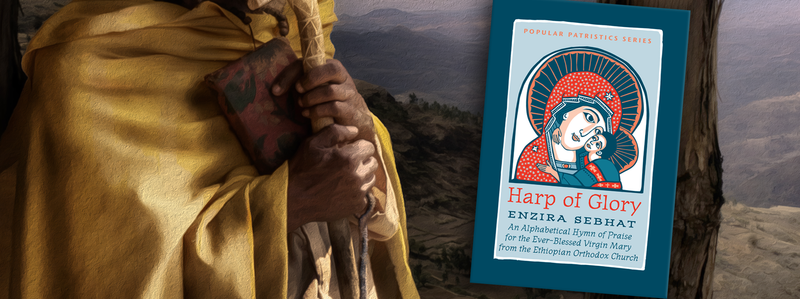Review: Harp of Glory
Posted by SVS Press on 13th Jul 2020
From the Ethiopian Orthodox Church Comes a distinctly African hymn of praise to the Virgin Mary:
For the roots of the tree of your love are entwined within my heart,
And that tree grows in stature and extends its branches to the
shores of the sea of my mind.
Its beauty has appeared like a flower upon my lips.
Anoint me then with fragrance from the perfume
Of your flower that has opened in bloom;
Its blood red color, from the side of your Son.
Through your prayers deliver me from the snares of Satan and all
his deceitful arts.
So sings an Ethiopian troubadour expressing the glory of the Virgin Mary with almost wildly romantic language in Harp of Glory, available from St Vladimir’s Seminary (SVS) Press. The passage is taken from the original alphabetical hymn of praise known as the Enzira Sebhat (“Harp of Glory”), which is here translated from a Latin text into English for the first time by renowned scholar and Archpriest, John Anthony McGuckin.
The hymn, possibly dating from the fifteenth century, gives many indications that it was written by a male monastic, writes McGuckin in his introduction. Dedicated to chastity, the monk “seeks after the Virgin’s blessing so as to live within the nuptial chamber of her inner house.” Such imagery mirrors the style of the love songs written by court troubadours, he writes, but it is also loosely modeled on the Song of Songs.
McGuckin calls Enzira Sebhat “no less than the African Akathist.” The poem clearly absorbed the Byzantine Akathist hymn in its pre-history but the language, he writes, is “quintessentially African” and “painted in distinctive and radiant earth-colors taken from the highlands of Africa and imbued with different perfumes,” as in this passage:
My Lady Mary—
More fragrant than cinnamon or balsam,
You are the shoot of the perfumed rose,
The jasmine by the seashore.
You are that fragrant tree of Enoch, the son of Jared.
O Virgin, Mother of the Mighty King,
By your righteousness deliver me
On that day of silence, when we are rendered dumb,
Just as the righteousness of your father Abraham was the salvation
of Lot.
The Biblical references and “types” to which Mary is compared abound in Enzira Sebhat, as do the liturgical allusions to her as the “temple court” or “priestly vesture.” McGuckin writes that if the reader were to look up all the Old and New Testament passages that the poem alludes to, he would be left with an “encyclopedic knowledge of the Bible as it referred to the mystery of salvation in Christ.”
Protestant readers might tend to think that the hymn heaps too much praise on the Virgin, praise that should be directed solely to Christ. On the contrary, writes McGuckin, “understanding her magnificence is the portico of the disciple’s initiation into the true significance of Jesus.” As the writer of the hymn puts it:
Blessed is he who keeps the way of your
commandments
And who proves himself an initiate of your Son’s teaching;
Under your shade will he rest,
And in the nuptial chamber of your house will he be
received.
Biblically and liturgically, Enzira Sebhat expresses the theology of the Ethiopian Orthodox Church. Although many Orthodox readers might think first of the Christological divisions, which sprang from the Council of Chalcedon, writes McGuckin, “it might be a more appropriate thing to think more generously of the great antiquity and profound spirituality of the worlds of the Coptic and Ethiopian churches, arenas of Christian life” and “veritable cradles of martyrs.”
Other Titles by John Anthony McGuckin available from SVS Press:
- The Collected Studies of John A. McGuckin
- Saint Cyril of Alexandria and the Christological Controversy
- The Ascent of Christian Law: Patristic and Byzantine Formulations
- On the Unity of Christ (St Cyril of Alexandria)
- Saint Gregory of Nazianus: An Intellectual Biography
This is volume #39 of the Popular Patristics Series. Click here to view a list of other books in the series.




